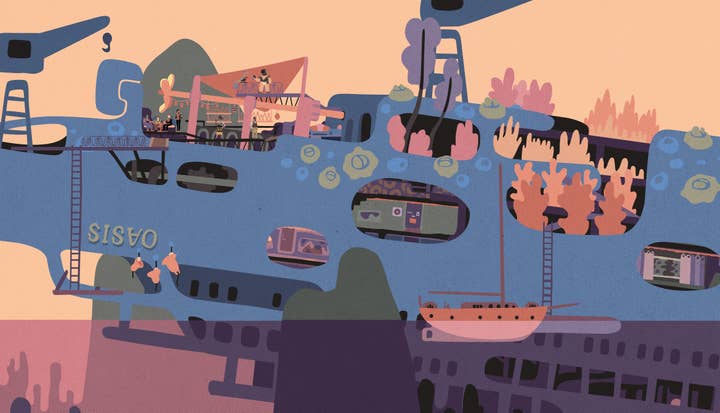Die Gute Fabrik and the necessity to tackle climate inaction
CEO Hannah Nicklin and AfterClimate's Benjamin Abraham on the importance of tracking emissions, how other studios can do the same
Die Gute Fabrik's Saltsea Chronicles is a story that documents the catastrophic consequences of climate change.
The game takes place generations after sea levels have risen, focusing on how communities rebuild and survive a flooded world.
It was only fitting, then, for the Danish developer to publish a report alongside the release of its latest title, sharing its carbon impact during development, from January 2020 to the launch of Saltsea Chronicles this October.
Die Gute Fabrik CEO Hannah Nicklin partnered with Benjamin Abraham, founder of environmental advocacy and consultancy firm AfterClimate, to commission the report.
As a single-project studio, the emissions produced by the game's development "are in effect the emissions of the studio, taken as a snapshot over the past three and a half years," Nicklin tells GamesIndustry.biz.
"Inaction is impossible if we want to survive. For me, there is no 'decide' when the option to not act results in a dead planet"Hannah Nicklin
The report estimated that the studio produced just over 47 tonnes of CO2 making Saltsea Chronicles – approximately 0.000058% of what big games firms acknowledged emitting last year.
"The AfterClimate net zero snapshot collected disclosures of over 80 million tonnes of CO2 from just the biggest games companies," Abraham tells us. "We also don't know how many indie studios there are, how big they are, or where they are in the world – we really need a revolution in emissions disclosures and attitudes toward sustainability in games."
For Die Gute Fabrik, most of its emissions (15.7 tonnes of CO2) came from international flights to attend events like GDC last year, in addition to Melbourne International Games Week and SXSW Sydney earlier this month.
"While the impact of Die Gute Fabrik's direct footprint is tiny, especially when compared to AAA games, there are so many games being made now that the collective impact really adds up," Abraham says.
In future, Nicklin wants to produce an annual emissions report for the studio "rather than project-based reporting," but she says she does see "merit in articulating [a] game's development as a whole to people interested in buying games."

She adds that tracking emissions wasn't really a decision. In publishing the report, the studio hoped it would hold Die Gute Fabrik to account and encourage developers of all sizes to do the same.
"The climate crisis is an existential threat not just for games, but for our lives," she notes. "Inaction is impossible if we want to survive. For me, there is no 'decide' when the option to not act results in a dead planet. I wish I had the power to do more."
For studios thinking that putting together such a report must represent a challenging task, Nicklin wants to highlight that it's not necessarily the case.
"I wanted to show studios of our scale that this kind of data is likely data they already have," she says. "There’s a bunch of work that’s already been done on tracking climate emissions for different activities, when it comes to a company setting.
"So, in a way, the fact we keep records of what we spend, who works with us, when, for how long, and we know what country they’re based in was already the raw data needed to track our emissions. All it takes is the calculations. We’d been keeping the records already."

Abraham gave Die Gute Fabrik three recommendations for the continued improvement of the studio's climate impact. These included annual emissions accounting and disclosure, setting a net zero target, and a further reduction in emissions.
Nicklin had already put several eco-friendly practices in place before commissioning the report.
Die Gute Fabrik is a purely remote studio operating four-days a week. Working from home and the shorter working week were motivated "by concerns around worker's rights and mental health" in addition to the environmental impact, Nicklin explains.
"People still live in their houses when they're not working – so in absolute terms, it's less beneficial; it just means DGF 'owns' fewer emissions if we work four days rather than five. But there are still definite benefits around the more energy intensive processes you use in developing a game."
For context, the report found that 1.8 tonnes of CO2 was emitted by devices from employees working from home, with 7.2 tonnes of emissions coming from heating (and a small amount from cooling).
To help decrease emissions further, Nicklin is considering adding more incentives to help employees move from using fossil fuels for heating and cooling their home office to a more sustainable power source.
"If you rent, we can pay you the time it takes you to work out a greener energy supplier – sometimes that time making a bunch of tedious phone calls is all it takes, but time is tough to find," she suggests. "I'm also going to try and work out if we can subsidise moving from gas central heating to solar/air heat pumps. There are government subsidies already, so if we could match fund them, it could make it much more affordable for our workers."
As for sustainable travel, the studio incentivises travelling by train instead of plane when available, by providing holiday bonuses: if an employee loses a day because they took the train instead of flying, they get that day back as holiday.
"It's worth pointing out that we fly very little compared to many studios," Nicklin says, adding that while they are trying to limit international travel, the flights to and from the US and Australia were necessary for the studio to acquire funding.
This includes travelling to GDC again next year, "because the survival of the company long term relies on us securing a partner to fund our next game, and that's where all the funding partners are," she states.
"It's hard to deny the effectiveness of going to the places [investors] are and showing 20 different potential partners your demo in a week. If I didn't go, it would be much harder to get those meetings and much harder to have them at the time the company needs for them to happen."
Nicklin continues: "I intend to limit our air travel to just essential events next year, which hopefully means just one return flight over the course of the next project – or at least the MVP of flights it takes to secure funding."

She also hopes the wider industry will be able to run hybrid or remote alternatives to big industry events, and for publishers and platforms to engage with them.
"It would have – like many things do when you act with climate justice in mind – a parallel positive impact on disability justice, COVID safety, access to power for people from countries often denied VISAs, and people from the global south for whom cities like San Francisco are wildly unaffordable," Nicklin details. "We know that it's possible because many people moved in that direction during the pandemic."
As for how studios can track their emissions, Nicklin highlights that companies only need three processes in place: annual accounts, a short survey for company workers, and a way of tracking hours worked.

In the case of Die Gute Fabrik, Abraham then took this information and used public resources such as the Greenhouse Gas Protocol to estimate the studio's carbon footprint. He also recommends using CO2 emissions calculation models, including one produced by Neogames Finland, the trade body for the Finnish games industry, which we highlighted earlier this year for its work on said model and its work to help studios calculate and offset their carbon footprint.
"Anyone that wants to start calculating their emissions can follow the different elements of the process highlighted in the report as a guide for their greenhouse gas inventory," Abraham says, adding that he encourages studios to reach out to him if they want to create their own report.
Nicklin hopes that this report not only encourages studios to calculate and track their carbon footprint, but to make changes that will benefit the environment.
"I feel like as a field and community of game makers, we could do a lot more to open up about our impact and be publicly accountable for it," she says. "It would help us also root out what we can change and what we need people with more power in the field to act on."
Abraham concludes: "If the report makes even a few people think about what they could do differently to make their games with a lower climate impact, then it's already a success."
Sign up for the GI Daily here to get the biggest news straight to your inbox






.jpg?width=291&height=164&fit=crop&quality=80&format=jpg&auto=webp)


